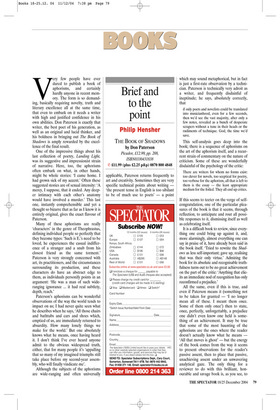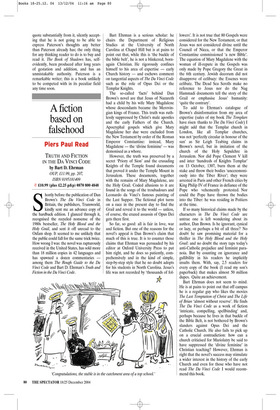Brief and to the point
Philip Hensher
THE BOOK OF SHADOWS by Don Paterson Picador, £12.99, pp. 208, ISBN0330431838 V £11.99 (plus £2.25 p&p) 0870 800 4848 Very few people have ever dared to publish a book of aphorisms, and certainly hardly anyone in recent memory. The form is so demanding, basically requiring novelty, truth and literary excellence all at the same time, that even to embark on it needs a writer with high and justified confidence in his own abilities. Don Paterson is exactly that writer, the best poet of his generation, as well as an original and lucid thinker, and his boldness in bringing out The Book of Shadows is amply rewarded by the excellence of the final result.
One of the impressive things about his last collection of poetry, Landing Light, was its suggestive and impressionist strain of narrative. Here, too, the aphorisms often embark on what, in other hands, might be whole stories: ‘I came home. I had grown sick of my accent.’ Often these suggested stories are of sexual intensity: ‘A mercy, I suppose, that it ended. Any deeper intimacy with each other’s anatomy would have involved a murder.’ This last one, instantly comprehensible and yet a thought so bizarre that as far as I know it is entirely original, gives the exact flavour of Paterson.
Many of these aphorisms are really ‘characters’ in the genre of Theophrastus, defining individual people so perfectly that they become types: ‘Such is E.’s need to be loved, he experiences the casual indifference of a stranger and a snub from his closest friend as the same torment.’ Paterson is very strongly concerned with art, its practitioners, and the circumstances surrounding its production, and these characters do have an abstract edge to them, as individuals personify points in an argument: ‘He was a man of such wideranging ignorance ... it had real subtlety, depth, reach.’ Paterson’s aphorisms can be wonderful observations of the way the world tends to impact on us; I had never quite seen what he describes when he says, ‘All those chairs and bathtubs and cars and shoes which, emptied of us, are immediately returned to absurdity. How many lonely things we make for the world.’ But one absolutely knows what he means, once having heard it. I don’t think I’ve ever heard anyone admit to the obvious widespread truth, either, that for many people it’s ‘appalling that so many of my imagined triumphs still take place before my second-year assembly, who will finally vindicate me’.
Although the subjects of the aphorisms are wide-ranging and often universally applicable, Paterson returns frequently to art and creativity. Sometimes they are very specific technical points about writing — ‘the present tense in English is too sibilant to be of much use to poets’ — a point which may sound metaphorical, but in fact is just a first-rate observation by a technician. Paterson is technically very adroit as a writer, and frequently disdainful of ineptitude; he says, absolutely correctly, that
if only poets and novelists could be translated into musicianhood, even for a few seconds, then we’d see the vast majority, after only a few notes, revealed as a bunch of desperate scrapers without a tune in their heads or the rudiments of technique. God, the time we’d save.
This self-analysis goes deep into the book; there is a sequence of aphorisms on the art of the aphorism itself, and a recurrent strain of commentary on the nature of criticism. Some of these are wonderfully disdainful of the psychology of the critic:
There are writers for whom no forms exist: too clever for novels, too sceptical for poetry, too verbose for the aphorism, all that is left to them is the essay — the least appropriate medium for the foiled. They all end up critics.
If this seems to teeter on the verge of selfcongratulation, one of the particular pleasures of the book is that it seems, through reflection, to anticipate and rout all possible responses to it, dismissing itself as well as celebrating itself.
It is a difficult book to review, since everything one could bring up against it, and, more alarmingly, almost everything one can say in praise of it, have already been said in the book itself. ‘Tried to rewrite the Shadows as less self-important; gave up, realising that was their only virtue.’ Admiring the book for its absolute and recognisable truthfulness turns out to be no great achievement on the part of the critic: ‘Anything that elicits an immediate nod of recognition has only reconfirmed a prejudice.’ All the same, even if this is true, and even if Paterson means it (something not to be taken for granted — ‘I no longer mean all of these. I meant them once. Some of them only once’) then to state, once, perfectly, unforgettably, a prejudice one didn’t even know one held is something of an achievement. It may be true that some of the most haunting of the aphorisms are the ones where the reader doesn’t actually know what he means — ‘All that moves is ghost’ — but the energy of the book comes from the way it seems to present observations for the reader’s passive assent, then to place that passive, unachieving assent under an unwavering analytical gaze. The only thing for a reviewer to do with this brilliant, honourable and savage book is, as you see, to quote substantially from it, silently accepting that he is not going to be able to express Paterson’s thoughts any better than Paterson already has; the only thing for any thinking reader to do is to buy and read it. The Book of Shadows has, selfevidently, been produced after long years of gestation and addition, and has an unmistakable authority. Paterson is a remarkable writer; this is a book unlikely to be competed with in its peculiar field any time soon.


















































































 Previous page
Previous page